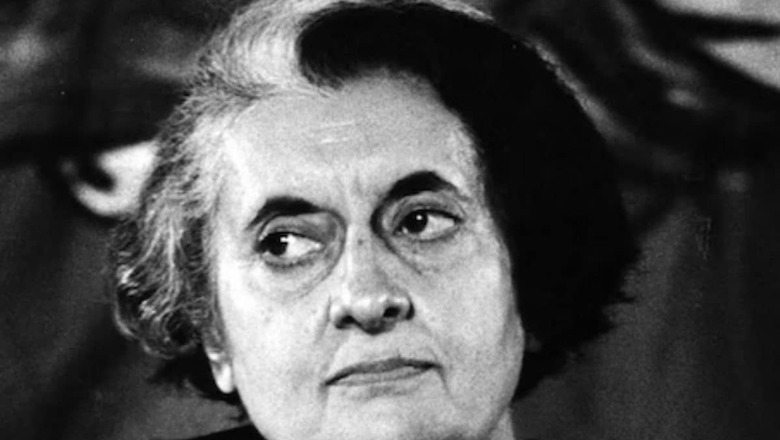
views
Rajmata Vijayaraje Scindia, a two-term Congress MP in 1957 and 1962, had annoyed Prime Minister Indira Gandhi by supporting newspaper baron Ramnath Goenka and ensuring his electoral victory from Vidisha, which was part of the erstwhile Gwalior state. A rank outsider and contesting as independent, Goenka’s victory was all the more spectacular as it came in the middle of an Indira wave in 1971. Rajmata, firmly with the Bharatiya Jan Sangh then, was a key campaigner for Goenka, whose newspaper (The Indian Express) had an anti-establishment reputation.
Indira had stepped up a campaign against former royals. At a public meeting in Jaipur, she hit out at former royals and took on Maharani Gayatri Devi, who had won the 1962 Lok Sabha polls by a mammoth margin, getting 192,909 votes out of the 246,516 that were cast. Gayatri Devi, a glamorous queen, had also fancied herself as Indira’s rival and worked hard to bring the Swatantra Party, which believed in free enterprise and closer ties with the West, close to the Right-wing Jana Sangh. Indira asked the voters “to go ask the maharajas and maharanis how much they had done for the people in their states when they ruled them and what they did to fight the British while they lived in luxury at the cost of the people,” adding, “If you look at the account of their achievements before Independence, it is a big zero.”
Taroon Coomar Bhaduri, the author-journalist, was, in the 1970s, posted in Bhopal as the state correspondent of The Statesman. The father-in-law of mega star Amitabh Bachchan wrote in his book, Off the Records, that when Indira came to know about Rajmata’s comfortable incarceration during the Emergency (Indira had declared a state of Emergency for a period of 21 months from June 25, 1975 to March 21, 1977 severely curtailing civil rights and political activities), she was furious and ordered her to be shifted to Delhi’s Tihar Jail.
Around the same time income-tax officers and several other agencies raided the Jai Vilas Palace, the seat of the Scindias in Gwalior. A report published in India Today on September 30, 1991, claimed that during the 1975 Emergency raid, taxmen had unearthed silver articles weighing 53 quintals and a trunkful of jewellery from Jai Vilas Palace. The Scindias were charged with economic offences, including gold smuggling, an allegation vehemently contested by Rajmata and her daughters.
The tax officials did not merely find silver and jewellery during the raid. They also took away with them notations for a new raga that Ustad Allauddin Khan had composed and named after Vijayaraje, thinking it was some secret code. The grateful maestro had composed the raga — perhaps within the first five years of Vijayaraje’s marriage to Jiwajirao maharaj Scindia— for sponsoring a surgery in Gwalior.
Housed in ward No. 3 at Tihar, Rajmata found a way to interact with Nanaji Deshmukh, a Jana Sangh veteran who was in prison along with Arun Jaitley, George Fernandes, Parkash Singh Badal, Choudhury Charan Singh, Lala Hansraj and others charged under the Maintenance of Internal Security Act (MISA).
Rajmata’s doctor had prescribed her yoga. In Tihar, Deshmukh held yoga classes in the men’s ward and the jail authorities permitted him to teach yoga to the Rajmata also. In their bestseller, Black Warrant (Roli Books), jailer Sunil Gupta narrated to co-author Sunetra Choudhury, “I do not know how much yoga they did, but these deliberations were the seeds of the Janata Party.”
For Gupta, then a young officer, it was fascinating to witness how Prakash Singh Badal acted as a facilitator between the Hindu Right and Indian communist leaders to form a broad platform against Indira. Badal first drew these ideologically hostile leaders into carom and, when some rapport had been developed, plans to overthrow the Indira regime through democratic means were contemplated. Gupta often saw Jaitley playing badminton with jail staff, Fernandes writing with a flourish and Charan Singh performing religious yagna.
Rajmata, Deshmukh, Jaitley and other political prisoners had drawn so much attention from the jail authorities — from warder to the superintendent, effectively six ranks and over 500 personnel — that a group of 13 facing life imprisonment plotted and carried out a successful jailbreak on March 16, 1976. They dug a tunnel from their barracks to escape. Not a single political prisoner joined them though.
The writer is a Visiting Fellow at the Observer Research Foundation. A well-known political analyst, he has written several books, including ‘24 Akbar Road’ and ‘Sonia: A Biography’. Views expressed are personal.



















Comments
0 comment